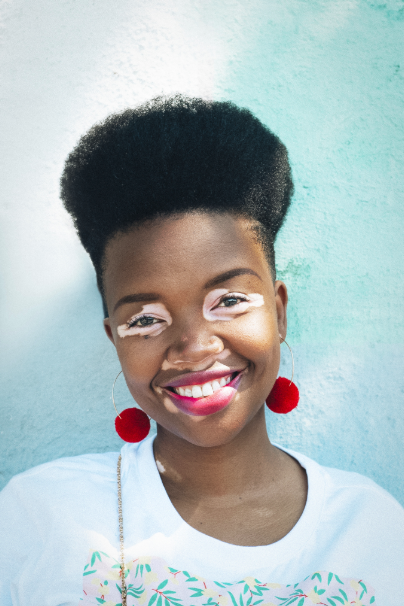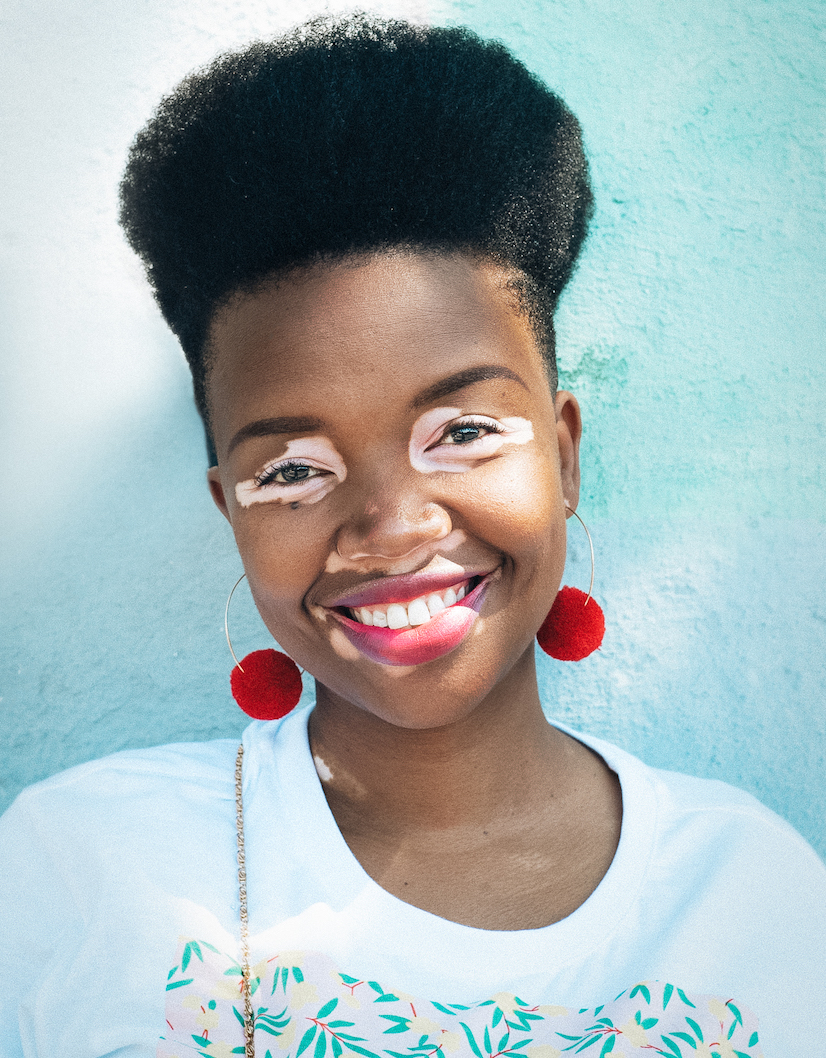- It's 2019 and mainstream media still wants us to believe that beauty is in the eye of the beholder. Pretty subjective, if you ask us. If the person who is observing gets to decide what is beautiful, how are we ever going to evolve as a society? It's overdue that we expand our definition of beauty as light skin, long hair, thin bodies and proportioned faces.

Photo: Luma Nascimento / #ShowUs / Getty Images
According to Dove Marketing Director, Amy Stepanian, "70% of US women don’t feel represented by everyday media images, 75% wishing media and advertisers did a better job of portraying women of diverse appearance — including age, race, shape and size." Not only are women feeling underrepresented and invisible, but the impact is also being felt in every aspect of their lives. Project #ShowUs offers the world the first publicly accessible photo bank of over 5,000 diverse and inclusive images of the everyday woman.

Photo: Whitney Hubbard / #ShowUs / Getty Images
For the first time, every woman of the 179 photographed has personally defined her own search descriptions and tags for her images, and we, as women, can now tell media directly where there has been a lack of diversity in beauty by using the hashtag #ShowUs on Instagram. This historical Dove, Getty Images, and Girlgaze initiative challenges the media and ad industry to accurately represent women how we want to be seen, in order to, positively impact the next generation of girls to grow up without feeling that they are being judged just on their looks.

Photo: Zenazi Msusa / #ShowUs / Getty Images
To further expand on the impact that representation in media & ads can have on women and future generations, I had the pleasure to speak with Social Scientist and Psychologist, Dolly Chugh, on the importance for the media to represent all members of society, why she coined the phrase "bounded ethicality", and how women can redefine the standard of beauty.
Check out our exclusive interview with Dolly Chugh below.
-
21Ninety: Why is it important for the media to represent all members of society? What are the negative impacts suffered by minorities when the media fails to represent them?
Dolly Chugh: If we think about the media — which is in some ways a window and in some ways a mirror — we want media to both give us a chance to see outside of our own world and get a window into what other people's lives are like. But also we the media to reflect back to us — what society is, who we are, where the society we live in. So when we think about the role of media in all of these forms, it's to capture a better understanding of what society is, as well as, letting us see ourselves in society. And that's why the importance of media representing all members of society is so critical.
When we don't represent all of us in society, the impact is almost incalculable because it creates a misunderstanding of who people are. It creates real misrepresentations of who's doing what. There have been media studies that, for example, have shown that local news over-represents Black people as being accused of crimes, as opposed to the actual crime statistic. So if someone was watching the local news, they would form a very fearful impression of the role their Black neighbors were playing in their community because there's a fear-based story being perpetuated through the media that isn't actually representing the reality.
21N: In 1987, historian, Carlos Cortez, wrote an article stating that “mass media curriculum has a particularly powerful educational impact on people who have little or no direct contact with members of the groups being treated.” Though we have come a long way since 1987, in your opinion, what does the media and ad agencies need to do to accurately portray underrepresented people in our society?
DC: I think first is to realize that we're not doing that and to realize there's still work to be done. And there seems to be growing awareness of that. The second step is to go beyond having a token representation of groups outside the dominant groups. So it's more than just having a Black person in the writer's room or having a woman on the news team, it's a matter of having true representation — so no one person is speaking for all people, no one perspective is representing all perspectives. That speaks to hiring in a way that is substantive and real, and that speaks to learning how to actually tap into the multiple perspectives once they are hired.
21N: It seems like we have a long way to go.
DC: Absolutely. But the one thing we do seem the be making some progress on this long way to go is, it seemed like even a year ago there was this narrative of, let's say movies, that representation with women as lead actresses or Black women as lead actresses, that wasn't going to sell tickets — everything from Black Panther to Wonder Woman to Crazy Rich Asians — we busted that argument. So that is what I feel, just recently, some significant progress has been made.
21N: Right. And even with US, that just broke records for having a Black, female lead, I'm wondering when there will no longer be a shock value that Black films with Black, female leads can actually drive sales.
DC: Right! When will it not be newsworthy? We do have a long way to go on that [laughs].
-
21N: As a professor of management and organizations at the Stern School of Business at New York University, you study how and why most of us are still prone to race and gender bias. Can you describe why you coined the phrase “bounded ethicality?”
DC: Sure! So "bounded ethicality" is a play on words. The original phrase was "bounded rationality" and bounded rationality was an idea that won a Nobel Prize about 50 years ago. A guy named Herbert Simon coined it, and he was speaking about the reality that our brains work on autopilot a lot of the times — there are limitations to how much computing power and how much storage each of us has in our brains. And as a result, our brains rely on shortcuts to do a lot of the work — they're bounded — and sometimes those shortcuts are going to lead to some mistakes in what we do and the decisions that we make that aren't super-rational. It may not be a purely rational choice, but it makes sense because the brain has to work with what it has.
What "bounded ethicality" is, my co-authors and I said, well, if that brain has to rely on shortcuts, wouldn't that same brain be prone to some mistakes when it comes to things like who to hire? Or, how to interpret whether or not we have a diverse cast in a movie? Isn't that the same brain that also relies on shortcuts that sometimes leads to mistakes on issues of social importance and ethical importance? So bounded ethicality is our way of saying, it's the same brain. It's the same limitations. And if we're willing to accept, why can't we have the same acceptance of our limitations — not acceptance like it's okay, but acceptance like, "oh, I need to own the fact that I may have had a blind spot about women or about people with disabilities." So bounded ethicality, I sometimes refer to as the psychology of good people — how good people with good intentions can sometimes make ethical mistakes.
-
21N: Dove, GirlGaze, and Getty Images have taken assertive action to create Project #ShowUs to shatter wrongful beauty stereotypes imposed by the media. Now that we aware of the negative impact, how will campaigns like this positively impact the psyche for women and future generations?
DC: That part about the media being a mirror that is reflecting back on us, well, part of how we see ourselves is shaped by these identities. Whether or not we see ourselves as beautiful is often shaped by what we perceive is beautiful by the standards and norms are in society. We use media as one — it's not the only — but as one input in figuring out what is normal. As psychologists, we call it social comparison: human beings are social comparing machines. We are always, in very subtle ways, figuring out if we are fitting the norm. So, it's the same thing. When we don't see ourselves represented in or we see ourselves represented in negative ways in the media, it shapes what we think is normal or okay for ourselves. And that's, ultimately, going to affect the possibilities I see for ourselves.
We have a great responsibility and great power — and what an amazing opportunity in the media to shape how people see themselves.
-
21N: Do you have any final words of advice or encouragement for women and girls who struggle to see themselves represented in the media? How can we overcome the age-old saying “beauty is in the eye of the beholder” to redefine the standard of beauty?
-
DC: I'm a mother of two brown-skin daughters, so I think that us as women and as girls must know that we can't simply just breathe in the smog. And I'm stealing the term "smog" from Dr. Beverly Daniel Tatum — it's her term that says all the stuff that we're constantly observing, seeing, listening, is like the smog that we breathe in. And sometimes smog is invisible. You think that you're breathing clean air, but what you realize is that there are particles in the air that are going into you and messing with your physiology. And that's happening to us mentally, as well. We're breathing in smog as we take in all the imagery, all the advertising, and that smog could have a negative impact. But it doesn't have to, as we're seeing with this campaign.
What I try to encourage to my own daughters is, let's know that that's smog. Let's not just take it in and not even realize we're breathing it. Let's note it when we see it: so by saying, isn't that interesting that all the women look the same in that show? Or, isn't it interesting that no one is actually that skinny in real life. So why is that what we are calling normal? Why is that what we are calling beautiful? I really think there is power in naming what the smog is so that we're not as prone to it.
-
Ready. Set. Boss. Our daily email is pouring out inspiration with the latest #BlackGirlBossUp moments, tips on hair, beauty and lifestyle to get you on track to a better you! Sign up today.
